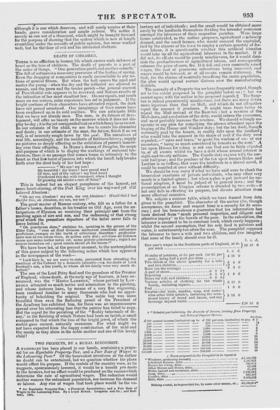DEATH OF CHILDREN.
THERE is no affliction in human life which causes such sickness of heart as the loss of children. The death of parents is a part of the order of things. " One generation goeth and another cometh." The fall of autumn is a necessary precursor of the leafing of spring. Even the dropping of companions is easily reconcilable to our no- tions of general fitness. But when the bolt spares the aged and smites the young —when the dry and the withered are allowed to remain, and the green and the tender perish—the general current of Providential rule appears to be reversed, and Nature revolts at the infraction of her most steadfast law. On our equals, and much more on our seniors, calm experience has sat in judgment. If the bright portions of their characters have attracted regard, the dark have not passed unnoticed. Our imaginings of their career have been swallowed up in its cold realities. We can anticipate little that we have not already seen. The rose, in its fulness of deve- lopment, will offer no beauty on the morrow which it does not dis- play to-day ; it is the yet unexpended bud on which fancy loves to rest. In our estimate of the child, we are free to create his character and deeds ; in our estimate of the man, the future, finish it as we will, is of necessity rough-hewn by the past. The narratives of real life, accordingly, and the incidents of fictitious history, supply no pictures so deeply affecting as the exhibition of parents lament- ing over their offspring. In HOME'S drama of Douglas, the scope and purpose of which is to display the workings of maternal ten- derness, there is no passage that comes home so intimately to the heart as that fine burst of passion into which the bereft lady breaks forth over the dead body of her last hope :
" My son I my son I
My beautiful I my brave ! how proud was I Of thee, and of thy valour ! my fond heart O'erflowed this day with transport, when I thought Of growing old amidst a race of thine."
This is indeed but an elegant paraphrase of the lament, yet more heart-stirring, of the Poet King over his wayward yet still beloved Absalom : " Oh my son Absalom t my son, my son Absalom I Would God I had flied for thee, oh Absalom, my son, my son !"
The great master of Roman oratory, who felt as a father for a father's losses, describes, in his treatise on Old Age, even the an- ticipations a Elysium as receiving their principal zest from the meeting again of sire and son, and the redressing of that strong grief which the premature departure of the latter never fails to leave behind it.
" Oh prmclarum diem," exclaims he, speaking in the person of the Elder Cato, " cum ad illud divinum animorum concilium ccetumque proficiscar, cumque ex hie turb& et colluvione discedam I proficiscar epim non ad eos solum viros, de quibus ante dixi; sed etiam ad Catonen2 sneum quo nemo melior natus est, nemo pietate przestantior ; cujus a me corpus crematum est ; quod contra decuit ab ill° meum !"
We have been led, at the present moment, to the contemplation of this grave subject by the following notice which has appeared in the newspapers of the week- " Lord Grey is, we are sorry to state, prevented from attendino.° the meetings of the Cabinet by a domestic calamity—via. the death of Lord Durham's son, a fine youth, to whom all his family were very much at- tached."
The son of the Lord Privy Seal and the grandson of the Premier of England, whose death, at the early age of fourteen, is here an- nounced, wag the "Master LAMBTON," whose portrait by LAW- RENCE attracted so much notice and admiration in the painting, and whose features have, by means of a very fine engraving, been rendered familiar to many thousands who had no oppor- tunity of beholding the original. The noble boy was more beautiful than even the flattering pencil of the President of the Academy has exhibited him, for there was an ingenuousness spread over his interesting face that the painter has failed to copy. But the regret for the perishing of the " fleshly tabernacle of de- cay," in the finishing of which Nature had been so lavish, is small compared to that which the loss of the bright jewel, of which the casket gave earnest, naturally occasions. For what might we not have expected from the happy combination of the mild and the manly as they shine in the noble mother and sire of this lovely child!


























 Previous page
Previous page